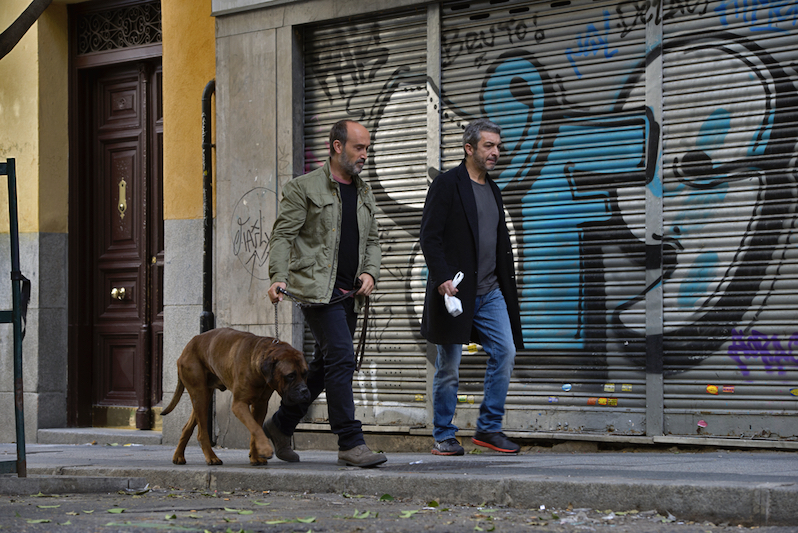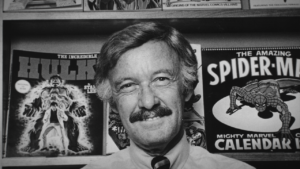Two Accomplished Actors—and a Cute Dog—Elevate ‘Truman’
Ricardo Darin and Javier Camara shine in Cesc Gay's film about imminent death and old friends getting together for the last time. Javier Cámara, left, and Ricardo Darín in "Truman." (IMDb)
Javier Cámara, left, and Ricardo Darín in "Truman." (IMDb)
Javier Cámara, left, and Ricardo Darín in “Truman.” (IMDb)
Winner of five Goya Awards (the Spanish Oscars), “Truman” is the kind of movie embraced by critics and shunned by general audiences. The 2015 film—which was released in the United States last week—won additional accolades at the San Sebastian and Hong Kong film festivals and was nominated in numerous other competitions, but it has earned only $8.8 million at the box office so far.
Ricardo Darin (“The Secret in Their Eyes”) won a Goya for his portrayal of Julian, an actor living with terminal cancer who decides to quit therapy and let nature take its course. Frequent Pedro Almodovar collaborator Javier Camara also won a Goya for playing Julian’s friend, Tomas, who travels from Montreal to Madrid to bid a final farewell.
Since his auspicious debut with “Nico and Dani” in 2000, director Cesc Gay has become a de facto chronicler of Spain’s Gen X, with movies including the 2012 comedy, “Una Pistola en Cada Mano,” as well as “Ficcion” in 2006. In “Truman,” his characters leave youth behind and come face to face with middle age in the starkest of terms.
“Everyone dies the best way they can,” Julian tells Tomas, as Gay lays out the circumstances of one man’s life and his efforts to put things in order—and maybe right a few wrongs—before his time is up.
Julian and Tomas first stop at a veterinarian’s office, where Julian openly frets about the emotional well-being of his pet boxer, Truman, projecting his own fears onto the animal.
At a restaurant, Julian confronts an acquaintance who, unsure of how to address the issue of his illness, pretends not to notice him. That night, Tomas sits in the audience with Julian’s sister, Paula (Dolores Fonzi), watching her brother act in a production of “Dangerous Liaisons.” The next day, the two men interview candidates to adopt the dog.
There is little plot in “Truman.” It’s mainly two guys talking about one of them dying while they try to figure out what to do with the dog. The problem lies in the fact that Julian’s imminent death is central to every scene, diluting powerful subtext.
As a character piece, the film focuses on actors Camara and Darin, a pair of accomplished performers who enjoy an easy rapport, having teamed up in Gay’s aforementioned “Pistola.” Together they elevate the material, co-written by Gay and Tomas Aragay, but remain hamstrung by a vaguely contoured relationship. At a glance, they could be friends, brothers or even lovers.
On an impromptu trip to Amsterdam, they pay a surprise visit to Julian’s son, Nico (Orio Pla). His time is limited due to midterms and social obligations, but they squeeze in a quick lunch. Two scenes later, when the two men return to Madrid, they learn from Julian’s ex-wife, Gloria (Elvira Minguez), that she had already informed the boy of his father’s decision, which raises questions that remain unanswered.
In the end, Julian finds a new master for his dog in a heartfelt scene that is emblematic of what is best about “Truman”: Despite its shortcomings, the emotional content never devolves into sentimentality. The story of two old friends getting together for the last time, with a cute dog thrown in for good measure, might be unbearably maudlin in the wrong hands. But Gay avoids heart-tugging claptrap by aiming for—and achieving—emotional veracity throughout, a rarity in popular cinema.
Your support matters…Independent journalism is under threat and overshadowed by heavily funded mainstream media.
You can help level the playing field. Become a member.
Your tax-deductible contribution keeps us digging beneath the headlines to give you thought-provoking, investigative reporting and analysis that unearths what's really happening- without compromise.
Give today to support our courageous, independent journalists.






You need to be a supporter to comment.
There are currently no responses to this article.
Be the first to respond.